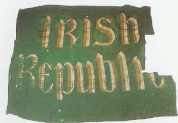Sometimes, up out of the mud that is political intrigue, comes a recollection that illuminates how flawed democracy can be when it is constructed on a foundation of ignorance, or prejudice or the unprincipled pursuit of power for power’s sake or for personal advancement.
In the mid 1990s, Eamon Gilmore responded to an observation that he was from the area of East Galway where Liam Mellows had led a successful campaign during the 1916 revolution, by saying that Mellows was ‘just another fucking Catholic nationalist’. That response was made outside RTE’s Television Centre after a ‘Questions & Answers’ programme, to me.
Eamon Gilmore is, of course, entitled to have an opinion about Mellows. In that, he may indeed have known more about Mellows 80 years later than did James Connolly in 1915. Did Connolly describe Mellows as ‘just another fucking Catholic nationalist’? He did not. Connolly said to his family that Mellows, then 20 years of age, was ‘the finest republican of them all’. So highly did Connolly think of Mellows, in common with the other members of the IRB Military Council, that when Mellows was placed under house arrest in England, Connolly sent his own daughter Nora to rescue Mellows and get him back in disguise to Ireland, so that he could command the forces in Galway.
There is a sad irony in the negotiations between Eamon Gilmore and Enda Kenny, the leader of Fine Gael, a party that has its political roots in the Free State’s first government. During the Civil War that ensued between that government and the republican anti-Treaty forces, Liam Mellows was captured along with Rory O’Connor, Joe McKelvey and Dick Barrett at the Four Courts, and held in Mountjoy Jail from June 1922. Six months later, on the 8th of December, the four genuinely heroic patriots of 1916 and the War of Independence were summarily shot – in brutal circumstances – in Mountjoy Jail by order of Fine Gael’s political ancestors, without trial. This is usually explained as an act of reprisal for the shooting of Sean Hales, a pro-Treaty member of parliament with which killing, as prisoners in the State’s custody, the four had no connection. But these extra-judicial murders were more probably a counter-revolutionary act, the clearing out of revered and therefore politically dangerous foes, and an act of State terrorism.
Eamon Gilmore claims to be a socialist, or at least a social democrat. What did James Connolly, the principal founding father of the Irish Labour Party say about socialism? He said that to be a socialist was to be a republican, and to be a republican was to be a socialist. How do Eamon Gilmore, and the rest of the old guard of the Labour Party, as they enter into negotiations with the right-wing Thatcherite Fine Gael Party, measure up to Connolly’s statement?
Neither Eamon Gilmore nor Enda Kenny bear any responsibility of the murders of Liam, Joe, Dick and Rory, or for the other awful acts of atrocity carried out by that first government. But they each have a responsibility, as political leaders, to know and understand the history of the State, of the Nation and of its people. More than that, they each have a responsibility to have their own distinct and identifiable political value system, and to transmit that value system, their personal political principles, to the citizens in a clear and honest way. There is no place in democratic political leadership for gross dishonesty, for playing the ‘cute hoor’, for ignorance, or prejudice, or the unprincipled pursuit of power for power’s sake or for personal advancement.
Did the voters not make that clear?
